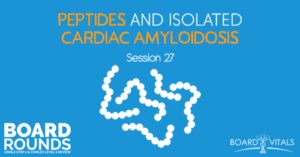Get 20% off a Single 1-on-1 Expert Advising Session Use it for ANYTHING! Learn More!

A patient with a history of arrhythmia is found to have atrial amyloid deposition on autopsy. Do you know what peptide is associated with this finding?
Dr. Karen Shackelford joins us for another round of interesting questions to help you ace your boards. If you haven’t yet, check out BoardVitals and use the promo code BOARDROUNDS to save 15% off.
Listen to this podcast episode with the player above, or keep reading for the highlights and takeaway points.
The autopsy of the patient with a history of arrhythmia revealed amyloid deposition in the atria but no other amyloid was found in the ventricles. Which of the following peptides is associated with amyloid deposition in the atria? And what is that peptide’s function?
(A) Calcitonin and reduction of blood calcium concentration
(B) Prolactin and gastric emptying
(C) Acetylcholine and positive chronotropy to sinoatrial node
(D) Immunoglobulin and cell-mediated immune response
(E) Atrial natriuretic peptide and vasodilation
[Related episode: Cardiac Electrophysiology—What is it?]
The correct answer is E. An amyloid is a group of diverse extracellular proteins in variable amino acid sequences and they have common physical properties.
Amyloid deposition and the extracellular deposition of the fibrils are composed of the subunit of varied serum proteins that form beta-pleated sheet configurations that lead to the histologic changes seen in amyloidosis.
Isolated amyloidosis is found only in a single organ such as this cardiac amyloidosis. Alpha-atrial natriuretic peptide is responsible for deposition in this isolated cardiac amyloidosis. This is what’s responsible for amyloid deposition in part.
The incidence appears to be maybe part of the normal process of aging. In one autopsy series, 86% of the patients between the age of 81 and 90 had isolated atrial amyloidosis. It may lead to heart failure.
Although diuretics are commonly given to patients with heart failure due to cardiac amyloidosis, beta-blockers, calcium channel blockers, and ace inhibitors may be harmful.
Calcitonin is associated with isolated amyloidosis of the thyroid. Prolactin is associated with lactation found in amyloidosis that is isolated to the pituitary gland.
Acetylcholine is the negative chronotropic sinoatrial node in the right vagus nerve.
The stimulation of the nerve decreases the firing of the SA nodes, increasing potassium and decreasing sodium and calcium movement to the cell.
Finally, immunoglobulin amyloid deposition is widespread and it’s the result of its light chain immunoglobulin deposition.
The point of the question was that isolated amyloidosis can affect many particular organs. This is different from more widespread amyloidosis related to immunoglobulin in terms of ideology and distribution.
Amyloid is not just that atrial natriuretic factor but you have to ask yourself where is it is as you’re reading this question. Is it in the parathyroid for prolactin or widespread for the immunoglobulin or is it in the atrium for the atrial natriuretic peptide?
Check out BoardVitals for their Step 1 and Level 1 QBanks. Use the promo code BOARDROUNDS to save 15% off. This can be used for your SHELF exam QBanks as well.

Lorem ipsum dolor sit amet, consectetur adipiscing elit
I just received my admission to XXXXX! This is unreal and almost feels like I am dreaming. I want to thank you for all of your help with my application. I cannot overstate how influential your guidance and insight have been with this result and I am eternally grateful for your support!
IM SO HAPPY!!!! THANK YOU SO MUCH FOR ALL YOUR HELP, IM INDEBTED TO YOU! Truly, thank you so much for all your help. Thank you doesnt do enough.
I want to take a few moments and thank you for all of your very instructive, kind and consistent feedback and support through my applications and it is your wishes, feedback, and most importantly your blessings that have landed me the acceptance!
I got into XXXXX this morning!!!! It still has not hit me that I will be a doctor now!! Thank you for all your help, your words and motivation have brought me to this point.
I wanted to once again express my heartfelt gratitude for your help in providing feedback during my secondary applications. Your guidance has been instrumental in my journey.
Just wanted to share my wonderful news! I received my first medical school acceptance! Thank you for all that you do for us Application Academy!!!
I am excited to tell you that I just got my third interview invite from XXXXX today! I can’t believe it. I didn’t even know if I was good enough to get one, let alone three – by mid-September. Thank you so much for all of your help and support up to this point; I would not be in this position without it!!
I wanted to thank you for helping me prepare for my XXXXX interview. Even in a 30-minute advising session, I learned so much from you. Thank you for believing in me, and here’s to another potential success story from one of your advisees!
I just received an acceptance with XXXXX! This is so exciting and such a huge relief and so nice to have one of our top choice schools! I also received an interview with XXXXX which brings the total up to 20 interviews! Thank so much, none of this would have been possible without you!

Join our newsletter to stay up to date
* By subscribing you agree to with our Privacy Policy and provide consent to receive updates from our company.
Resources
Advising Services
Podcasts & Youtube
Books
About
"*" indicates required fields